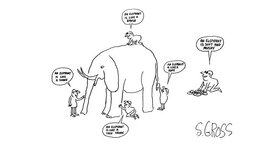dbz
Senior Member
- Joined
- May 29, 2022
- Messages
- 557
- Gender
- male
- Basic Beliefs
- Max 1:3 possible that Jesus b. Joseph/Pantera was a historical personage
I think there is insufficient evidence to establish the proposition as more likely to be true than not.So ... What do Infidels think?
The proposition being that the gospel accounts of Jesus are based on a single flesh and blood historical person.
Your arguments in this thread have been nothing but a giant web of arguments from ignorance. Don't just ask the question, spell out the answer, and provide the facts and logic to support what you believe to be the correct answer. If you want to criticize Carrier's work, or something someone wrote, explain why you think they are wrong instead of simply begging the question over and over.
Really? I would of never guessedLet's recapitulate a bit. This thread is about "The Christ Myth Theory" — the theory that the Gospels derived ZERO material from the life of an historic Galilean named Jesus who was executed under Pontius Pilate.
[. . .]
It was only a few weeks ago that I even became aware of the Christ Myth Theory...
That's not how historians use Bayes. The questions you have raised for probability estimates actually beg the question of historicity. They assume situations that would exist if the core of the gospel story is historical -- which is what we are trying to determine, so we can't begin with that assumption.
Bayesian reasoning is applied to the actual evidence before us. That is what Carrier has done and in that respect, for all his faults in other areas, he has applied Bayesian reasoning in history correctly.
Last edited:


